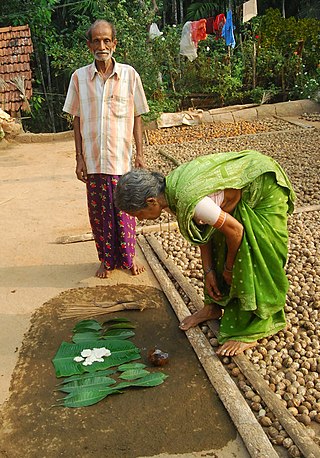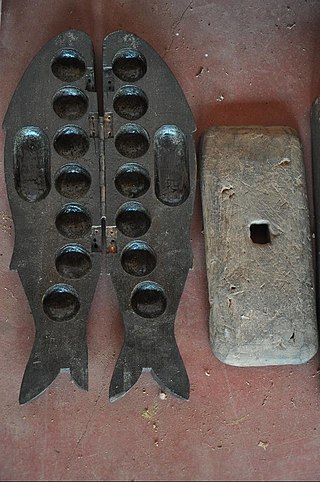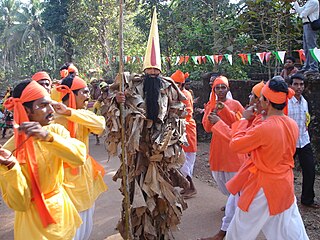
Dakshina Kannada district is located in the state of Karnataka in India, with its headquarters in the coastal city of Mangalore. The district covers an area nestled in between the Western Ghats to its east and the Arabian Sea to its west. Dakshina Kannada receives abundant rainfall during the Indian monsoon. It is bordered by Udupi district to the north, Chikmagalur district to the northeast, Hassan district to the east, Kodagu to the southeast and Kasaragod district of Kerala to the south. According to the 2011 census of India, Dakshina Kannada district had a population of 2,083,625. It is the only district in Karnataka state to have all modes of transport like road, rail, water and air due to the presence of a major hub, Mangalore. This financial district is also known as the Cradle of Indian banking.

Tulu Nadu or Tulunad is a region and a proposed state on the southwestern coast of India. The Tulu people, known as 'Tuluva', speakers of Tulu, a Dravidian language, are the preponderant ethnic group of this region. South Canara, an erstwhile district and a historical area, encompassing the undivided territory of the contemporary Dakshina Kannada and Udupi districts of Karnataka State and Kasaragod district of Kerala state forms the cultural area of the Tuluver.
Arebhashe or Aregannada or Gowda Kannada is a dialect of Kannada mainly by Gowda communities in the region Madikeri, Somwarpet, and Kushalnagar taluks of Kodagu district, Sullia, taluks of Dakshina Kannada district; Bangalore and Mysore districts in the Indian state of Karnataka. As well as Bandadka, Kasaragod District in the Indian state of Kerala, Arebhashe is also called Gowda Kannada. The language was recognized by the Karnataka State government and formed an academy in 2011 to preserve the culture and literature of the Arebhahse Region which is named as Karnataka Arebhashe Samskruthi mathu Sahitya Academy supported by then Chief Minister D. V. Sadananda Gowda.

The Tulu people or Tuluvas are an ethno-linguistic and ethno-cultural group from Southern India. They are native speakers of the Tulu language and the region they traditionally inhabit is known as Tulu Nadu. This region comprises the districts of Dakshina Kannada and Udupi in Karnataka and part of Kasaragod district in Kerala, with Mangalore, Karnataka being the commercial hub. The Census report of 2011 reported a population of 1,846,427 native Tulu speakers living in India.
The Bunt people are an Indian community who historically have inhabited the Tulu Nadu region in South India. Bunts were traditionally a warrior-class or martial caste community, with agrarian origins, forming the landed gentry of the region. They are the dominant land-owning, farming and banking community of Tulu Nadu and speak Tulu and Kundagannada as their mother tongue. Today, the Bunts are a largely urbanised community, with a population size of less than one million worldwide.

Būta Kōlā, also referred to as Daiva Kōlā or Daiva Nēmā, is a shamanistic Hindu dance performance practised, believed and protected by the Tuluvas of Tulu Nadu and parts of Malenadu of Karnataka and Kasargod in northern Kerala, India. The dance is highly stylized and performed as part of 'Bhootaradhane' or worship of the local deities worshipped by the Tulu speaking population. It has influenced Yakshagana folk theatre. Būta kōlā is closely related to Theyyam of North Malabar region and Theyyam is the evolutionised form of Bhuta Kola.

Pili Vesha in "Tiger Masque" is a folk dance unique in coastal Karnataka. Pilivēṣa is performed during Navratri to honour the Goddess Durga, whose favoured animal is the tiger. Mangalore Dasara is one of the festivals during which large number of enthusiasts participate in this ritual. It was originated in Udupi District of Karnataka and initially performed during the Krishna Janmashtami/Mosarukudike and Ganesha Chaturthi at Mangalore, Udupi, Moodabidri, Kundapur and many other places in Tulu Nadu.
Banakal is a Malnad town in Mudigere Taluk, Chikkamagaluru district of Karnataka, India. This town is situated atop the Charmadi hills in the Western Ghats section. The Western Ghats is one amongst twenty-five identified hot spots for biodiversity conservation in the world. Banakal is surrounded by coffee estates and paddy fields and known for its pleasant weather throughout the year. Banakal town is the headquarters of Banakal Hobli.
Mangalore district that was partitioned from the erstwhile South Canara, has been multicultural and is a little different from the prevalent culture of the Carnataca state of India. A native of Mangalore is known as a Mangalorean in English, Kudladakulu in Tulu, Kodyaalkar in Konknni, Manglurnavaru in Kannada& Maikaaltanga in Byari.

Aati Kalenja is an ancient traditional folk art form practiced by Tulu people from the region of Tulu Nadu, India which is believed to bring prosperity during Aati which is one of the months in Tulu calendar. It normally comes in the months of July and August.
Mangaloreans are a collection of diverse ethnic groups that hail from the historical locales of South Canara (Tulunaad) on the south western coast of Karnataka, India, particularly the residents native to Mangaluru.

Keddaso also spelled Keddasa, or Bhumi Puje, is popularly known as the "festival of worshipping Mother Earth" in the Tulu Nadu region of South India. Mother Earth gets menstruate and the day is celebrated holistically in Tulunad in the name of ‘Keddasa’. This is an important four-day fertility worship celebrated in the closing days of Tulu month Ponny. This festival shows the environmental awareness of the people residing at that region.
Tulu Calendar is a traditional Indian solar calendar, generally used in the regions of Northern Parts of Kasaragod District of Kerala, and Dakshina Kannada, Udupi Districts of Karnataka, India. The indigenous or Tulu speaking people of Tulu Nadu, Tuluvas who migrated from this region to other places, are the common followers of this calendar system. The first day of this calendar falls on Bisu. The first day of a Tulu Month is called as Thingade / Singade and the last day known as Sankrathi Day.

The Siri Sandhi also Siri Paddana or Epic of Siri is an epic poem in the Tulu language. Consisting of 15,683 lines of poetry, it is the longest poem in Tulu. The epic is essentially a biography of a legendary Bunt princess Siri Alvedi and expands to describe the fate of her progeny – son Kumara, daughter Sonne and grand daughters Abbage and Darage. The epic declares Siri's divinity and also that of her progeny and she is worshipped as a Daiva across Tulu Nadu region of South West India in temples known as Adi Alade. Siri is the patron deity of the Tulu people. Her worship and mass possession cult surrounding her transgresses caste and ethnic lines. The Epic of Siri, though in Tulu, is well known in Kannada speaking populations in and around Tulu Nadu. It is recited in parts in a highly ritual style during the annual festival of Siri Jatre and mass possession festival called Dayyol. Complete recitation of the epic takes close to about 25 hours. The Epic of Siri has been translated into English by Lauri Honko, a Finnish linguo-folklorist.
The Panar are a community found mainly in various districts of Karnataka including Kundapura Taluk and Udupi District, India.
Mera is a community of Tulu Nadu, India, an indigenous people mainly spread in the areas of modern Kasaragod District of Kerala and Mangalore, Udupi, Coorg Districts of Karnataka. They follow a matriarchal family system called as "Bari". The Language spoken by Mera is Tulu.

Kangeelu or Kangilu is a traditional folk dance from Udupi and Dakshina Kannada region in the South Indian state of Karnataka. It is a spiritual dance performed on the full moon day in Mai month of Tulu calendar. It is believed to keep away disease, evil spirits, and other negative energy and serves to foster peace, harmony, and a community spirit. The dance is performed as a part of a seven day Kangilu Kunitha to propitiate the goddess Khadgeshwari and Koragajja, a spirit considered as a form of god Shiva.

Siddavesa is a type of religious and traditional folk dance. The Arebhahse people of Sullia perform this dance during the full moon in the month of Suggi on the Tulu calendar. During this month, Suggi Nalike is also performed. Siddavesha performances take place from late evening until morning, with the dancers visiting the homes of people from all social strata.
Pattanaje is a one-day celebration of the end of the festival season in Tulunadu, India. The people of Tulunadu have their own religious and social deadlines for all kinds of festivals. It is a fixed-day celebration which falls on the tenth day of the second solar month called Besha in the regional calendar of Tuluva, generally on 24 or 25 May of each year.









